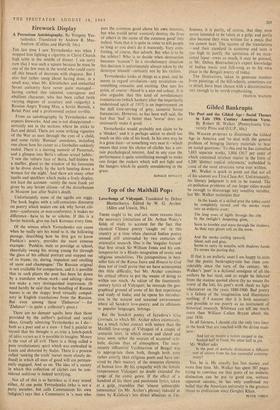Top of the Maithili Pops
Love-Songs of Vidyapati. Translated by Deben Bhattacharya. Edited by W. G. Archer. (Allen and Unwin, 30s.) THERE ought to be, and are, more reasons than the necessary limitations of Dr. Arthur Waley's fields of study to account for the fact that classical Chinese poetry 'caught on' in this country at a time when classical Indian poetry seemed still unrevealed by two centuries of orientalist research. One is the 'singular feature' that first struck Sir William Jones and his con- temporaries in a Hindu integration of erotic and religious sensibilities. The juxtaposition in best- seller lists of the Kama Sutra and Honest to God does not of itself prove that we have surmounted this little difficulty, but Mr. Archer continues his critical efforts to put the means of doing so within our reach. As editor of the fourteenth- century lyrics of Vidyapati, he retreads the geo- graphical ground of some of his first experience and study of India; and he opens his introduc- tion in the natural and seasonal environment where all Sanskrit love-poetry, and its offshoots in popular languages, belongs.
But the Sanskrit poetry of Jayadeva's Gita Govinda, to which Mr. Archer refers extensively, has a much richer contact with nature than the Maithili love-songs of Vidyapati of a couple of centuries later, in which moon and cloud and lotus seem rather the sources of accepted sym- bolic diction than of atmosphere. The enor- mously influential Vaishnavism of Bengal was to appropriate them both, though both were rather courtly than religious poets and have sur- vived by their mastery of the sensuous elements of human love. By his sympathy with the female temperament Vidyapati no doubt extended the range of the erotic genre. If the effect of a hundred of his short and passionate lyrics, taken at a gulp, resembles that 'almost unbearable tumescence' (in Mr. Archer's phrase) induced at times by Kalidasa's less direct allusions in The Seasons, it is partly, of course, that they were never intended to be taken at a gulp; and partly also because they were written for a music that we cannot hear. The success of the translations —and their standard in economy and taste is too high to justify the quotation of an occa- sional lapse—owes as much, it may be guessed, to Mr. Deben Bhattacharya's expert knowledge of Indian music and folk-song as to his own place in the Bengali poetry of today.
The illustrations, taken in generous number from paintings of the hill-schools, sometimes cut to detail, have been chosen with a discrimination rare enough to be worth emphasising.
FRANCIS WATSON






























 Previous page
Previous page